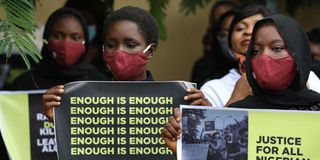Commonwealth nations say ‘no more’ to violation of women's rights

Protesters hold placards outside the Nigerian Police Headquarters in Abuja during a demonstration to raise awareness on sexual violence in Nigeria recently. Commonwealth nations have launched an anti-GBV campaign.
What you need to know:
- Commonwealth Secretariat to launch 'Commonwealth Says No More' campaign to promote multi-sectoral approach towards tackling GBV.
- Body concerned that the Covid-19 pandemic has rolled back gains made in empowering women economically.
- UK minister says domestic abuse is a systemic and widespread human rights violation of our time.
The Commonwealth Secretariat is set to launch an anti-gender based violence (GBV) campaign aimed at reinforcing efforts towards ending violation of women and girls' rights.
Secretary-General of the Commonwealth of Nations Ms Patricia Janet Scotland said the 'Commonwealth Says No More' campaign will promote multi-sectoral approach towards tackling GBV.
"The campaign will offer an impressive array of expert resources and tools to support action by everyone from governments, to private individuals to help combat domestic abuse and violence against women and girls," she said on September 3, during a virtual meeting of Commonwealth ministers for Women’s Affairs and Gender and Development on Covid-19.
Covid-19 pandemic
Ms Scotland was concerned that the Covid-19 pandemic has rolled back gains made in empowering women economically, a key pillar to freeing and protecting women from violence.
"We know that gaining financial control or autonomy empowers women to take control of their lives and claim their rights; to say no to violence, discrimination and harmful traditional practices," she said.
"Yet, despite all the years of work on the economic empowerment and financial inclusion of women, we still have unfinished business...and we must be honest that this work has been set back made more difficult by this crisis," she said.
Combating violence
Cabinet Secretary for Public Service and Gender Prof Margaret Kobia said collaborative efforts were necessary to combating violence against women and girls. She said the pandemic has frustrated execution of strategies for bridging gender gaps across all sectors of development.
"We started 2020 with the aim to accelerate actions towards the realisation of gender equality and the empowerment of all women and girls, everywhere but Covid-19 changed the turn of events," she said.
She noted that: "Covid-19 pandemic is not just a health issue but a profound shock to our societies and economies. And women are at the heart of care and response efforts."
She said Covid-19 has brought to the fore the necessity of digital literacy among women.
Use of technology
The working from home schedule, she said, has shown the need for women to have a know-how on use of technology in order to take advantage of opportunities available in the online space.
United Kingdom's Minister for women Baroness Elizabeth Berridge said the country has developed anti-domestic violence laws tackling its various forms ranging from psychological, economic, physical and emotional.
"Domestic abuse is a systemic and widespread human rights violation of our time," she said.
Covid-19 has seen the global prevalence of GBV rise by an average of 30 per cent attributed to high exposure to factors inducing the violence including economic distress due to job loss and constant proximity to perpetrators.





